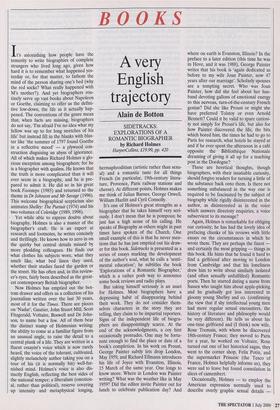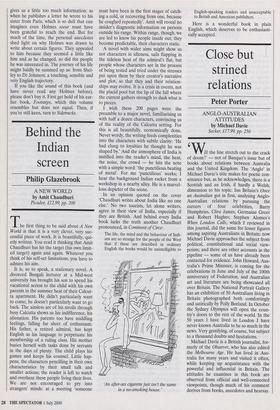BOOKS
A very English trajectory
Main de Botton
SIDETRACKS: EXPLORATIONS OF A ROMANTIC BIOGRAPHER by Richard Holmes HarperCollins, £19.99, pp. 420 It's astonishing how people have the temerity to write biographies of complete strangers who lived long ago, given how hard it is to remember what happened yes- terday or, for that matter, to fathom the mind of the person sharing one's bed (why the red socks? What really happened with M's mother?). And yet biographers rou- tinely serve up vast books about Napoleon or Goethe, claiming to offer us the defini- tive low-down, the life as it actually hap- pened. The conventions of the genre mean that, when facts are missing, biographers do not say, 'I'm afraid I've no idea what my fellow was up to for long stretches of his life' but instead fill in the blanks with blus- ter like 'the summer of 1797 found Goethe in a reflective mood' — a plywood con- struction disguising an abyss of ignorance. All of which makes Richard Holmes a glo- rious exception among biographers; for he is a biographer with qualms. He knows that the truth is more complicated than it will ever seem in a biography, and he is pre- pared to admit it. He did so in his great book Footsteps (1985) and returned to the theme in Dr Johnson and Mr Savage (1996). This welcome biographical scepticism also animates Shelley: The Pursuit (1974) and his two volumes of Coleridge (1989, 1998).
Yet while able to express doubts about biography, Holmes is also a master of the biographer's craft. He is an expert at research and footnotes, he writes concisely and thrillingly. He knows how to zero in on the quirky but central details missed by more plodding colleagues. He finds out what clothes his subjects wore, what they smelt like, what bed linen they used, whether their studies faced the garden or the street. He has often and, in this review- er's eyes, fairly been described as the great- est contemporary British biographer.
Now Holmes has emptied out the bot- tom drawer and offers us a collection of his journalism written over the last 30 years, most of it for the Times. There are pieces on ‘Nadar', Gautier, John Stuart Mill, Scott Fitzgerald, Voltaire, Boswell and Dr John- son, to name but a few. All of them bear the distinct stamp of Holmesian writing: the ability to come at a familiar figure from an unusual angle, to raise the detail to a central plank of a life. They are written in a fluent essayist's voice which is now rarely heard, the voice of the tolerant, cultivated, slightly melancholy author taking you on a tour of his (it is normally his) well-fur- nished mind. Holmes's voice is also dis- tinctly English, reflecting the best sides of the national temper; a liberalism (emotion- al, rather than political), reserve covering up intensity and metaphysical longing, hermaphroditism (artistic rather than sexu- al) and a romantic taste for all things French (in particular, 19th-century litera- ture, Provence, Paris railway stations and cheese). At different points, Holmes makes me think of Julian Barnes, George Orwell, William Hazlitt and Cyril Connolly.
It's one of Holrnes's great strengths as a biographer that he takes himself very seri- ously. I don't mean that he is pompous; he just has a high sense of his calling. He speaks of Biography as others might in past times have spoken of the Church. One small example of this is that he never men- tions that he has just emptied out his draw- er for this book. Sidetracks is presented as a series of essays marking the development of the author's soul, what he calls a 'senti- mental education'; he subtitles the book `Explorations of a Romantic Biographer,' which is a rather posh way to announce some book reviews and radio plays.
But taking himself seriously is an asset for Holmes. Most biographers have a depressing habit of disappearing behind their work. They do not consider them- selves characters in the story they are telling, they claim to be impartial reporters. Signs of the independent life of biogra- phers are disappointingly scarce. At the end of the acknowledgments, a coy hint occasionally protrudes. One may be fortu- nate enough to find the place or date of a book's completion. In his work on Proust, George Painter subtly lets drop London, May 1959, and Richard Ellmann introduces his life of Joyce with Evanston, Illinois, 15 March of the same year. One longs to know more. Where in London was Painter writing? What was the weather like in May 1959? Did the editor invite Painter out for lunch to celebrate publication day? And where on earth is Evanston, Illinois? In the preface to a later edition (this time he was in Hove, and it was 1988), George Painter writes that his book is 'again dedicated as before to my wife Joan Painter, now 47 years after our marriage'. Scholarly spouses are a tempting secret. Who was Joan Painter, how did she feel about her hus- band devoting gallons of emotional energy to this nervous, turn-of-the-century French genius? Did she like Proust or might she have preferred Tolstoy or even Arnold Bennett? Could it be valid to spare curiosi- ty not simply for Proust's life, but also for how Painter discovered the life, the bits which bored him, the times he had to go to Paris for research, what hotels he stayed at and if he ever spent the afternoon in a café opposite the Bibliotheque Nationale dreaming of giving it all up for a teaching post in the Dordogne?
These are heretical thoughts, though biographers, with their insatiable curiosity, should forgive readers for turning a little of the substance back onto them. Is there not something unbalanced in the way one is required to be fascinated by the subject of biography while rigidly disinterested in the author, as disinterested as in the voice which answers directory enquiries, a voice subservient to its message?
Again, Holmes is remarkable for obliging our curiosity; he has had the lovely idea of prefacing chunks of his reviews with little essays on the circumstances in which he wrote them. They are perhaps the finest and certainly the most gripping — things in this book. He hints that he found it hard to find a girlfriend after moving to London from Cambridge and that his loneliness drew him to write about similarly isolated (and often sexually unfulfilled) Romantic poets. Then he started dating a nurse from Sussex who taught him about apple-picking and he gradually got less interested in gloomy young Shelley and co. (confirming the view that if shy intellectual young men had more regular sexual encounters, the history of literature and philosophy would be very different). He tells us about his one-time girlfriend and (I think) now wife, Rose Tremain, with whom he discovered 18th-century France; they moved to Paris for a year, he worked on Voltaire, Rose turned out one of her historical sagas, they went to the corner shop, Felix Potin, and the supermarket Prisunic (the Tesco of France, Holmes helpfully informs us), they were sad to leave but found consolation in slices of camembert.
Occasionally, Holmes — to employ the American expression normally used to describe overly graphic sexual details — gives us a little too much information; as when he publishes a letter he wrote to his sister from Paris, which is so dull that one imagines even Holmes soeur must have been grateful to reach the end. But for much of the time, the personal anecdotes shed light on why Holmes was drawn to write about certain figures. They appealed to him because they seemed a little like him and as he changed, so did the people he was interested in. The journey of his life might baldly be summed up as: from Shel- ley to Dr Johnson; a touching, sensible and very English trajectory.
If you like the sound of this book (and have never read any Holmes before), please don't buy it. First get hold of his ear- lier book, Footsteps, which this volume resembles but does not equal. Then, if you're still keen, turn to Sidetracks.



























































 Previous page
Previous page